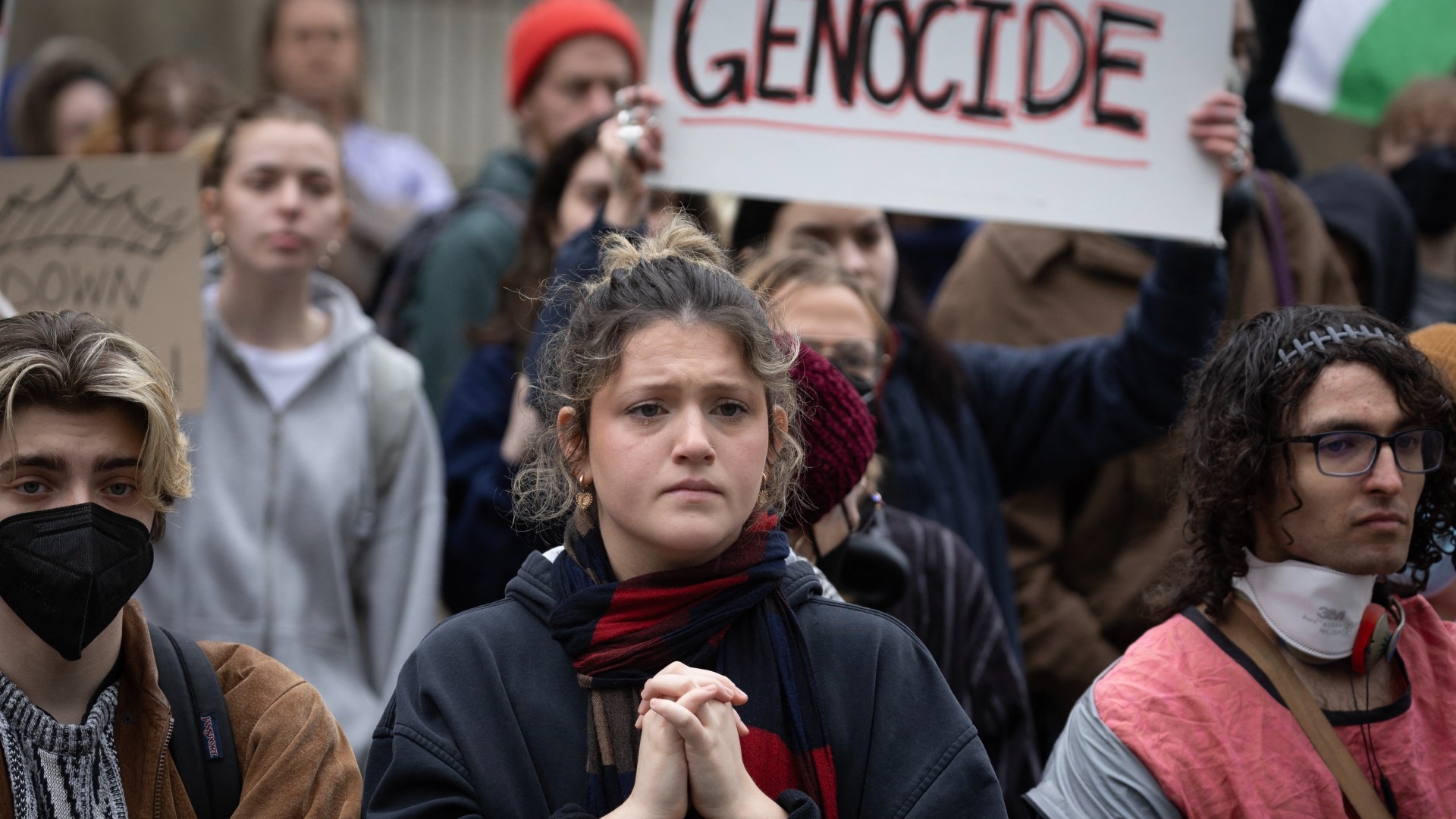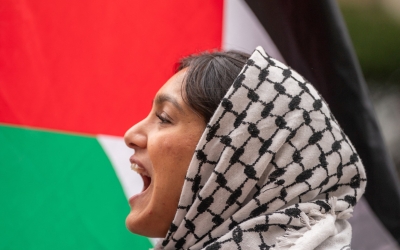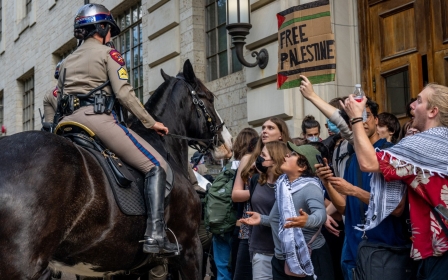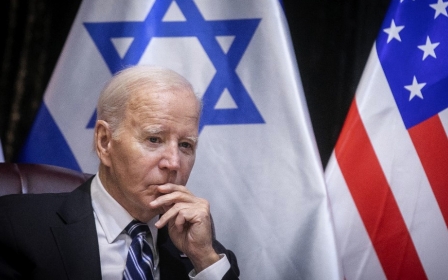Anti-woke assault on pro-Palestine protests highlights need for nuanced debate

The student movement protesting Israel’s genocidal war on Gaza has garnered euphoric support on some campuses and attracted worldwide media attention.
It has sparked both sympathy and cynical opposition, with various rhetorical tactics employed to incite disgust, mistrust and hatred of the students advocating against the collective punishment of two million Palestinians.
Cynics portray the protesting students as an ungrateful elite aligning with Hezbollah and Hamas, while euphoric supporters fail to acknowledge the heightened disparity between academia and broader society, which is particularly acute in the US as compared with Europe.
But to dismiss the gravity of this prevailing phenomenon by simply reiterating a conventional moral discourse against "wokeism" is a deeply problematic stance - one that embraces conspiracy theories and vague rhetoric.
While wokeism itself can be detrimental, inasmuch as it tends to emanate from a partial assessment of traumas and grievances - one in which traumatic distress serves as the ultimate metric and indispensable precondition for advocacy - it is imperative not to make the “anti-woke” fight an end in itself.
New MEE newsletter: Jerusalem Dispatch
Sign up to get the latest insights and analysis on Israel-Palestine, alongside Turkey Unpacked and other MEE newsletters
Indeed, "wokephobia", which manifests as an unfettered assault on people who might not even espouse "woke" values, is ruthless and hypocritical. Since 7 October, some cynics have chosen to make the anti-woke crusade their paramount mission. But they will find reality to be much more nuanced than they might have envisioned.
We cannot deny the humanistic motivations of many of the protesting students. Whether this humanism is consistent or consequential might be up for debate, but to deny it altogether, and to criminalise students based on their activism, is dangerous.
Protest dynamics
A phenomenon has persisted since the end of the Cold War, in which reverence for 20th century social struggles tends to dismiss any public demonstration that does not correspond with their black-and-white images of disciplined workers’ protests, where demonstrators marched in lockstep. But such nostalgia does not preclude adopting a cautious, yet welcoming attitude towards the current protest dynamics in our society.
This could be enriched by embracing a receptive stance towards noteworthy protests, while also engaging in a critical examination of the predominant viewpoint among demonstrators.
Follow Middle East Eye's live coverage of the Israel-Palestine war
Two intertwined considerations arise here: firstly, praise for a movement that opposes the financing of wars and atrocities through tax dollars, and secondly, an acknowledgement of certain misunderstandings of the Palestinian predicament, including flawed parallels with the struggles of indigenous peoples in North America and post-colonial contexts such as South Africa.
Such comparisons overlook crucial differences. Unlike the genocide of indigenous peoples in North America or the demographic majority of the Black communities in South Africa, the Palestinian question centres on a distinct form of colonial settlement more intertwined with the historical conflict between Abrahamic monotheisms.
The relative passivity of the 'Arab street' compared with the ongoing activism on some American campuses speaks volumes about the current state of the world
It is deeply connected to the incapacity of European civilisation to assume integration as a solution to the Jewish question.
Additionally, it is linked to the disintegration of the millet system, a form of administrative organisation employed in the Ottoman Empire wherein religious communities, or millets, were granted autonomy in managing their own affairs, including legal and educational matters, under the overarching rule of the empire.
In the post-Ottoman world, some millets transformed into nations while others became confessional communities.
A better consideration of Jewish and Palestinian Arab issues is necessary, but much of the intelligentsia in the region has only superficially attempted this, often sacrificing one of the two issues.
Meanwhile, the relative passivity of the “Arab street” compared with the ongoing activism on some American campuses speaks volumes about the current state of the world. Scholars protesting in the US do so rightly: after nearly seven months of enabling Israel’s war, the Biden administration cannot escape being classified as one of history’s executioners.
Tumultuous chapter
American students expressing solidarity with Palestine do not want to endorse nor assume responsibility for this war and its consequences.
Yet, it’s important to contextualise this action, which stems from inhabitants of global capitalism’s metropolises, whether or not they are from peripheral regions. The situation differs for those enduring the hardships of post-Arab Spring authoritarianism.
The passivity of the Arab streets is a significant reminder that societies deprived of freedom cannot behave seasonally as if they were free. This doesn’t mean that the peoples of the Arab world don’t wholeheartedly support Palestinians, and they have often expressed this - but they do not have the same demands as Americans, where Washington is funding and enabling the war. They are at the mercy of regimes that expropriate them without needing a fiscal policy to do so.
We are in a tumultuous chapter of history, where crises are sweeping the globe, showing no mercy to any culture or ideology. As the Gaza war risks becoming another Nakba for Palestinians, the deep-seated internal crisis within Israeli society and governance demands a nuanced, balanced and wide-reaching approach.
Yet, we cannot ignore the imperative to stand against the scourge of war.
The quandary that arises is whether an anti-war advocate must necessarily champion peace. Here lies a perplexing conundrum, dividing those who equate opposition to war with a pursuit of peace, and those who, while condemning war, view the dominant western framing of “peace in the Middle East” as merely a veil for the ongoing dispossession of the Palestinian people.
Similarly, within the discourse surrounding the clash of civilisations, a paradox emerges wherein the steadfast denial of such a clash existing coincides with essentialist reductions of the “West” versus euphoric glorifications of the “Rest”.
This dynamic underscores the urgency for a shift towards a more nuanced understanding of the civilisational clash, thus paving the way for strategic contemplation on how to transcend such divisions.
The views expressed in this article belong to the author and do not necessarily reflect the editorial policy of Middle East Eye.
Middle East Eye delivers independent and unrivalled coverage and analysis of the Middle East, North Africa and beyond. To learn more about republishing this content and the associated fees, please fill out this form. More about MEE can be found here.






